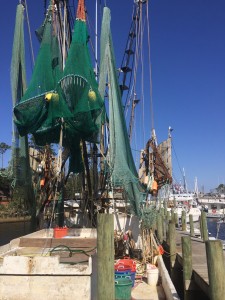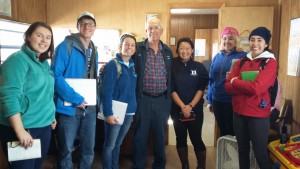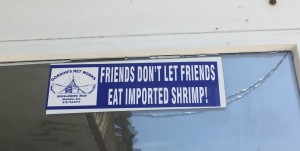
Being a fisherman has never been easy. The labour is ponderous, conditions out at sea can turn rough, and the bounty depends on the whims of Mother Nature. But being a fisherman in today’s environment is even tougher than before. Globally, many commercially-important fish populations have declined, fuel prices have risen, international seafood trade has grown, and policies regulating fisheries have increased. Fishing communities extend from commercial fishers to recreational ones, supporting organizations, and secondary businesses such as seafood restaurants, gear sellers, and transporters. All of which suffer various social, economic, and political impacts as the state of marine fisheries evolve.

In the second block of classes at the Duke Marine Lab, I took Marine Fisheries Policy with Dr. Barbara Garrity-Blake. I was hesitant about the class initially. Logically, I’ve always known that conservation biology which I am interested in is a highly interdisciplinary study. While I acknowledged the importance of recognizing the human factor and political structure, it was always in the science where I felt decisions should be based on. Additionally, I’ve only admired the concept of social science from afar, never delving its fundamental frameworks, the unique methods used, and deciphering its own set of vocabulary. But if there’s a time to try something new, college is definitely it — and there is no better place to explore a new field than the Marine Lab.

It was a comfortably small class – 3 undergrads, 3 master students – with varying degrees of experience. Some were recreational fishers, some have already worked in the Marine Fisheries Commission, others grew up near fishing communities. I on the other hand didn’t know the first thing about resource management or the dozens of abbreviations that would come flying fast and furious. But boy did we plunge straight into the waters. By the first Thursday, we were already out in the field speaking to fish house owners in Sneads Ferry, an area tied closely with the fishing industry, a couple hours drive from Beaufort. At the start of the week, I read my first ethnography and by the end, I was writing my own mini one.

That was doubtlessly my favourite part of the course — interacting with the local residents, exploring the area, and of course having wonderful seafood along the way. We visited long-time fishermen, fish wholesalers, a sea turtle hospital, business owners trading fishing equipment, aquaculturists, residents championing eat-local movements; and ‘fish doctors’ AKA fisheries scientists retired and current visited us in class, along with managers working at state and federal levels, and even academics from our very own faculty. The diversity of voice we had the pleasure of hearing was absolutely eye-opening to me, so many issues I have never though of, and perspectives that were outside my personal experience which I would never have considered. No other course I have taken has challenged my personal worldview as much as this course has broadened my understanding of other lifestyles, which my upbringing in a foreign city has simply never intersected with.

The learning curve for me was a steep one, grappling with governance at the state, federal, then international level, and by no means does this post adequately summarize the breadth of issues we covered in the packed four weeks. Understanding how stock assessments are conducted and policies enforced, learning of the small-scale fisheries disadvantaged by globalization, weighing ecosystem services against economic value — difficult issues that literally kept me up at night with the realization of the depressing state of fisheries.
I know that when writing about environmental issues, we are always cautioned against the “doom and gloom” story. I’ve often been told that the piece needs to end with an uplifting tale to imbue hope. But I did not seem an overwhelming helplessness and ineffectuality in this class as I normally do when watching particularly drearily-toned documentaries. Rather, it was a stark reality-check on the status of fisheries, a common resource for everyone, and it gave me even more motivation to do whatever small part I can. To use the consumer power I wield responsibly: eat locally, take a stand against seafood likely sourced from illegal fishing that exploits both sea and people, and educate my friends and family. It can sound like a burdensome task to question every meal, but as Jean Beasley of the sea turtle hospital said, we are privileged to gain all this wonderful knowledge in the education we receive, so “don’t be a blob!”


Very well written and informative post. I think the phrase “Question every meal” says so much about where we are on so many fronts. Might get that on a Tshirt.
But it also goes to what we all need to remember and act on – the people should can and do have the power to change things. And its always been a handful that get things started.